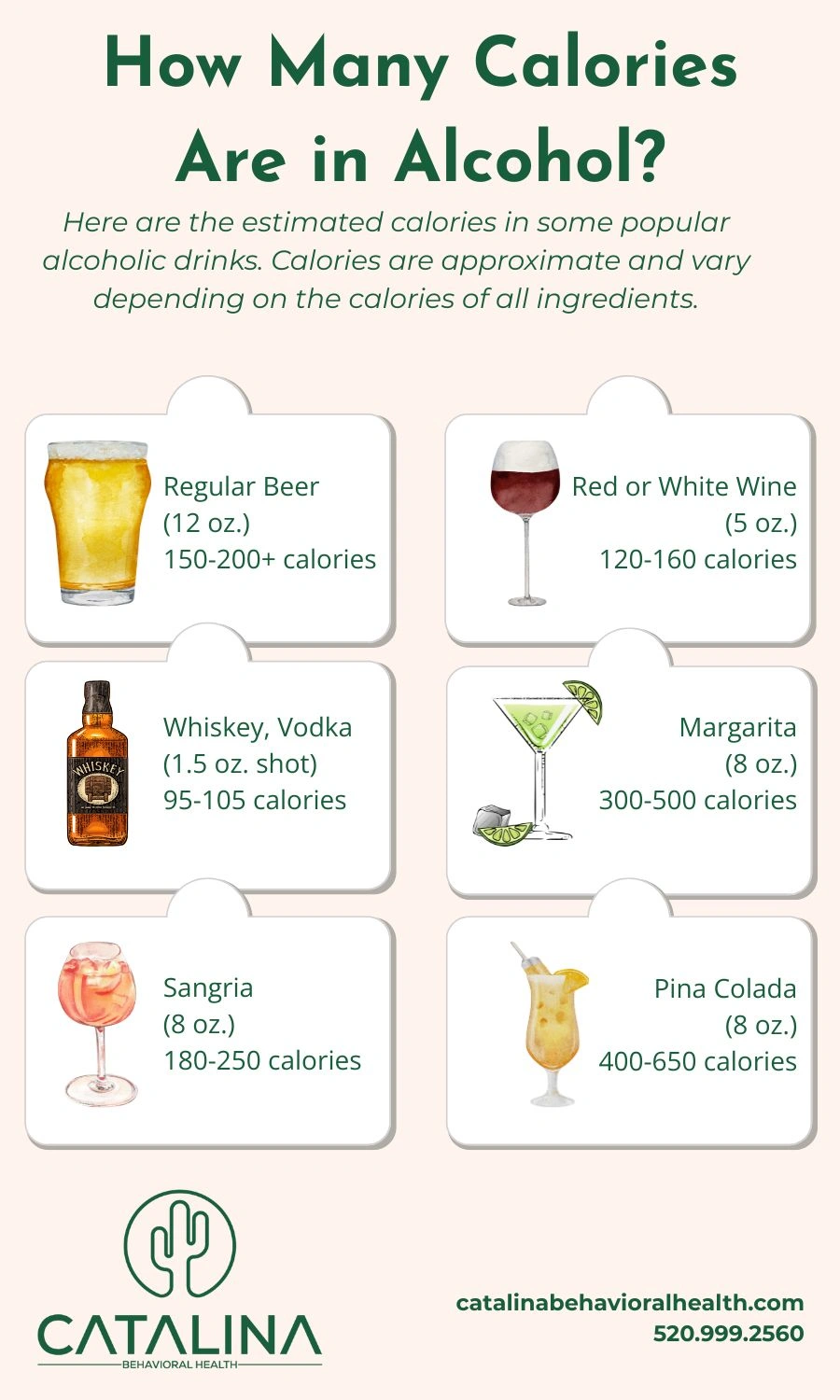The Benefits of Quitting Alcohol Often Includes Weight Loss
One of the overlooked potential benefits when you stop drinking alcohol is weight loss.
Still, you might wonder: How much weight can you lose by not drinking alcohol?
It depends on how many calories you drink regularly. But any weight loss from ending alcohol consumption creates a ripple effect on your overall calorie intake, leading to additional physical and mental health benefits. You’ll likely see improvements from better blood pressure to improved sleep quality if you shed just a few pounds of excess weight.
Our JCAHO-accredited treatment center in Tucson, Arizona, is here to support you as you become alcohol free. The customized treatment options at Catalina Behavioral Health are evidence-based and effective.
We’ve helped hundreds of people quit drinking alcohol and seen what happens to your body – the transformation in mental and physical well-being is transformational.
We invite you to keep reading to learn how much weight loss you may achieve when you stop drinking and the other health benefits of cutting out alcohol consumption.
Get Effective Detox and Rehab Options at Catalina
Cutting Out Alcohol: Connecting Calorie Intake to Weight Loss
Cutting out alcohol use is one of the best weight management methods. Because weight loss occurs when you burn more calories than you consume, removing alcohol can create a caloric void. Most people don’t realize the relatively high calorie count of their alcohol intake.
Our past client “Sophie” is a good illustration of how alcohol can have an impact on one’s weight. Before coming to Catalina, Sophie chased opioid painkillers with two glasses of wine each night to ease her anxiety.
At 250 calories per day, the wine totaled 1,750 calories per week and 7,000 calories per month. By simply avoiding unhealthy food choices and stopping alcohol, Sophie lost two pounds of fat in the first month of her recovery.
Always slightly overweight and with a family history of cardiovascular disease, Sophie used her new sobriety to jumpstart improved nutrition and improve her overall health. She lost another 15 pounds after leaving recovery and is now within the healthy ranges in all categories.
How Much Alcohol Does It Take to Lose Weight or Gain Weight?

Even small amounts of alcohol can have an impact on your weight, especially over time. One or two mixed drinks or bottles of beer might not sound like a lot. Still, they actually add hundreds of extra calories to your diet, without satiating your appetite.
Over a week, you could add approximately 2000 empty calories (depending on your alcoholic beverage choice), or just over 1/2 pound of weight gain, by drinking. In a month, that adds up to just over two pounds.
What Happens to Your Body When You Stop Drinking Alcohol?
When you eliminate alcohol intake, your body starts to heal more quickly than you’d expect if you have good liver function. Within 5 to 10 days after the initial withdrawal, you may notice a reduction in bloating and increased energy.
Over time, your liver, digestive system, and metabolism begin functioning efficiently. For many people, weight loss around the midsection is one of the early visible signs.
Alcohol Withdrawal Timeline
The flip side to the initial benefits can be severe withdrawal symptoms. The alcohol withdrawal timeline can vary, largely depending on how much and how frequently you’ve been drinking.
For most clients, the withdrawal symptoms start in 6 to 12 hours after they stop drinking. After 24 to 72 hours without alcohol, the symptoms of withdrawal can peak and then start to improve.
Alcohol Withdrawal Symptoms

You should not quit drinking without professional help, especially if you have Alcohol Use Disorder. The symptoms are generally mild for light to moderate drinkers. But those drinking excessive amounts of alcohol experience more severe withdrawal symptoms.
The only safe place to detox from alcohol is to do so under the supervision of a medically supervised detox center, like the program we offer at Catalina. Our staff provides a safety net by constantly monitoring each client’s vital signs and providing prescription medications to help cope with the side effects of withdrawal.
Below are the withdrawal symptoms. Once you read them, you will understand why it’s important to get professional help with the detox process:
- Anxiety or nervousness
- Irritable or moody
- Restlessness
- Sleep disruptions
- Headaches
- Stomach ache or nausea
- Vomiting (can lead to dehydration)
- Sweating
- Alcohol cravings
- Shaky hands or tremors
- Rapid heart rate
- High blood pressure
- Sensitivity to sounds and light
- Difficulty concentrating
- Delirium tremens (a severe condition that requires emergency treatment)
Detox at Catalina Behavioral Health also provides clients with access to medication-assisted treatment, which helps clients with alcohol misuse safely stop drinking.
Get Accredited Treatment Programs at Catalina
Other Benefits You May Experience When You Quit Alcohol Drinking
You will consume fewer calories and your body will begin to lose weight when you quit drinking, as long as you make healthy food choices and eat sensible portion sizes. A trimmer body, especially around the tummy, is a common indicator of a longer life. The weight loss shares a direct connection to these other healthy benefits of quitting alcohol:
Heart Health Improvements and Slowing Heart Disease

Too much alcohol can strain your entire cardiovascular system, especially when you drink frequently or in large quantities. When quitting alcohol, your heart can improve quickly. High blood pressure can often be brought back to safe blood pressure ranges, and the risk of heart disease is reduced.
Studies even show that alcohol increases inflammation, contributing to irregular heartbeat and possible damage to the arteries.
Improved Blood Sugar and Diabetes
Many clients have been surprised when they learned how seriously alcohol can impact blood sugar levels and diabetes. Drinking alcohol leads to a series of spikes and crashes, especially when mixed in sugary cocktails.
Alcohol addiction affects the risk of developing insulin resistance and type 2 diabetes. When you quit alcohol and lose weight, you may regain control over your own health.
Lower Cholesterol Levels
With extended use, alcohol affects your cholesterol levels. Your liver and pancreas are vital in how the body processes fats and cholesterol. When you drink excessively, the digestive organs become overloaded and are unable to process fats efficiently. This connects to how your body reduces LDL (bad cholesterol) and supports HDL (good cholesterol), promoting a healthy heart.
Better Hydration
Alcohol is a diuretic that leads to dehydration. You’ll be better hydrated when you stop drinking alcohol, which has a positive impact on every system in your body. You’ll notice clearer skin, fewer headaches, and better joint comfort. You might also have more energy when you’re better hydrated.
Improved Immune System
Alcohol slows your body’s immune response, making you more likely to catch colds or bacterial infections. After stopping alcohol consumption, your immune system will rebuild. You’ll feel healthier, recover from injuries or infections faster, and be better equipped to fight the flu season.
Lower Your Stress and Worry
Some clients started drinking alcohol to relieve stress, but the relief it provides is short-lived. Once clients have quit, they find their anxiety and stress easier to manage. They eliminate the rollercoaster ride of alcohol addiction and gain emotional balance and a more positive perspective.
Better Sleep Means Mental Clarity

Alcohol consumption disrupts your sleep cycles, particularly rapid eye movement (REM) and slow-wave sleep, the deep sleep stages that support emotional regulation, memory, and physical energy. When you stop drinking alcohol, your sleep becomes more restful. The brain gets the rest it needs to provide you with better focus and decision-making.
Less Heartburn and Indigestion
Alcohol irritates the stomach lining and loosens up the valve that keeps acid from rising into the esophagus, a situation that leads to acid reflux. It can also slow digestion, causing bloating and discomfort. Stopping alcohol intake leads to better digestion and overall gut health. Most clients report feeling greater comfort after meals without drinking.
The Alcohol Addiction Recovery Journey Starts by Calling Us for Insurance Verification
The admissions department at Catalina utilizes an effective insurance verification process, which helps clients access the necessary treatment while also saving money.
The insurance companies have historically been reluctant to authorize mental health benefits; leave that entire process to our experts to ensure minimal out-of-pocket costs. We work with most major insurers and will work hard to help you get the treatment you deserve – affordably.
Up To 100% of Rehab Costs Covered By Insurance
You Deserve Sobriety Today – Call Catalina for Support
You may have noticed some health issues – blood pressure, indigestion, or others – and suspected they resulted from drinking. Alcohol use disorder often means carrying extra weight, which can contribute to those problems. When you stop drinking, you can stop some of these health issues and feel better again, within about a week after stopping.
Our team of treatment professionals will assess your treatment needs and construct an evidence-based treatment plan tailored to your recovery goals. You’ll work with licensed counselors to address the drinking and face any underlying causes of the alcohol abuse (often trauma or a mental illness).
Call us today for support – you deserve a fresh start.







